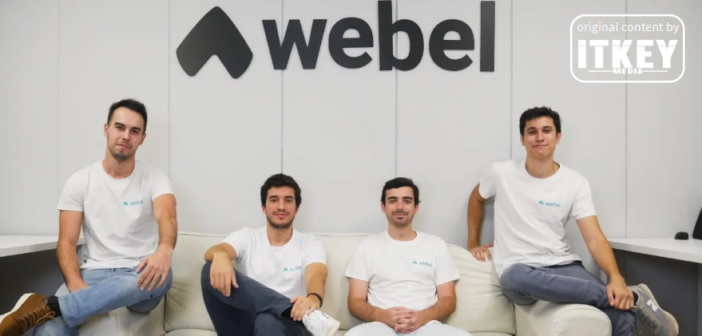- Spanish gig economy startup Webel raised EUR 1.4M of investment from Prague-based ZAKA VC and other new and repeat investors
- The startup operates a digital platform connecting users with at-home services professionals
- The new funding will help Webel accelerate international expansion and the development of new features
This November, the Madrid-based gig economy platform Webel closed its EUR 1.4M round of investment. The well-known Czech fund ZAKA VC (invested in ExoMatter, among others) invested in the startup repeatedly, joined by the Spanish Decelera Ventures and the Palo Alto-based Goodwater Capital.
The Underserved Space of Decentralized At-Home Services

Nacho Tejero Mancho, Co-Founder and CEO at Webel
Nacho Tejero and his team started Webel in 2018, when they were still students in Software Engineering and Business Administration and Law. By that time, they already had experience of working for corporations and launching three other companies (none of which took off). With this experience under their belts, the team saw a gap in a massive sector of home services, and their entrepreneurial spirit inspired them to try and conquer this space over which nobody had been dominating at the time.
Webel is a platform that connects users with trusted professionals for various home and personal services in 19 cities across Spain. Through a user-friendly interface, customers can effortlessly book services such as house cleaning, handyman tasks, babysitting, beauty treatments, pet care, tutoring, fitness training, and more. The platform allows users to compare professionals, book services in just a few moments, and manage payments securely.
‘Webel has been a story of a thousand failures and just a few successes. It’s an incredibly challenging sector, and it has been a constant battle until we started seeing strong metrics,’ Mr Tejero admits.
While it did take Webel four years to achieve PMF, the metrics are strong indeed. If in year four (January 2022), the platform was facilitating 250 services per month, by October 2024 – just 32 months later – the number was over 40,000 services per month.
Prioritizing Affordability and Data-Driven Growth
Webel claims that its services are 50% cheaper than any competitor. Mr Tejero explains that this is due to the fact that the platform doesn’t operate on a lead model or as a managed marketplace (which has high management costs). Instead, it is entirely decentralized, not unlike Airbnb. This allows the company to set transaction costs (including operational, support, and other expenses) at just 2%, compared to the regular 20-25%.
‘Also, the way our app works promotes perfect competition among professionals, leading to significantly lower prices compared to others,’ Mr Tejero adds.

Samo Zálešák, Associate, Member of Investment Committee, and Sustainability Portfolio Manager at ZAKA VC
For ZAKA VC’s associate Samo Zálešák, Webel exemplifies the qualities that the fund values in early-stage startups: innovation, transparency, and data-driven growth.
‘Our initial investment was driven by their unique platform leakage prevention feature, which incentivizes service suppliers to stay engaged by reducing fees and boosting visibility. This allows Webel to expand efficiently while fostering strong relationships with service providers,’ Mr Zálešák states.
The startup’s reporting capabilities, adaptability, and operational transparency further solidified ZAKA VC’s confidence.
‘They are a standout in our portfolio, and their strategic approach has been a key driver of their continued success and growth,’ the investor continues.
‘One of our core values as a fund is investing in teams with the potential to scale their companies into unicorns. Webel not only has a growing and scalable business model but is also driven by an exceptional team with the vision and determination to achieve extraordinary outcomes. Their ability to execute and lead their company toward exponential growth has been a key factor in our decision to repeatedly invest in them,’ Decelera Ventures’ founder and CEO Marcos Martin agrees.
London and Other Destinations

Marcos Martin Larrañaga, Founder and CEO at Decelera Ventures
The exponential growth for which the startup plans to use most of the raised funds is the geographic expansion. The platform’s first international launch already took place in London.
‘We analyzed a set of factors, such as population density – to minimize the gig worker’s travel distances as much as possible, competition, GDP per capita, average age, and especially the number of cities within the country with over 500,000 inhabitants – the perfect threshold for launching Webel. London is one of the ‘youngest’ cities in Europe, and has an excellent range of upper-middle class population, so it ranks at the top in nearly all of our criteria. This, combined with other variables – such as language, location, etc – made it the first city we chose,’ the entrepreneur explains.
Webel schedules subsequent expansions for Q1 2025.
Ongoing Product Development
Aside from geographic expansion, Webel sets out to leverage cross-selling opportunities across different service categories on its platform and strengthen its operational capabilities by developing proprietary internal software.
‘We are building a series of features that ‘activate’ PMF in different categories. For example, a few months ago, we developed a feature that allowed professionals to send specific quotes for certain tasks through the chat. This activated the handyman category. Now we are working on similar features that will activate other categories, like at-home manicure services,’ Mr Tejero tells ITKeyMedia. Additionally, Webel develops new software that will enable companies to offer home services.
The demand for at-home services has evolved significantly in recent years, largely influenced by the digital-savvy younger generations. This shift highlights a growing preference for convenience, as reflected in the rising need for professionals offering services like home cleaning, handyman work, childcare, elder care, and personal training. It’s up to platforms like Webel to simplify this process and provide users with a seamless means to book a variety of services promptly and effortlessly. In the meantime, such platforms also serve as a valuable resource for professionals, enabling them to showcase their offerings, set their own terms and rates, and build credibility.

Kostiantyn is a freelance writer from Crimea but based in Lviv. He loves writing about IT and high tech because those topics are always upbeat and he’s an inherent optimist!





